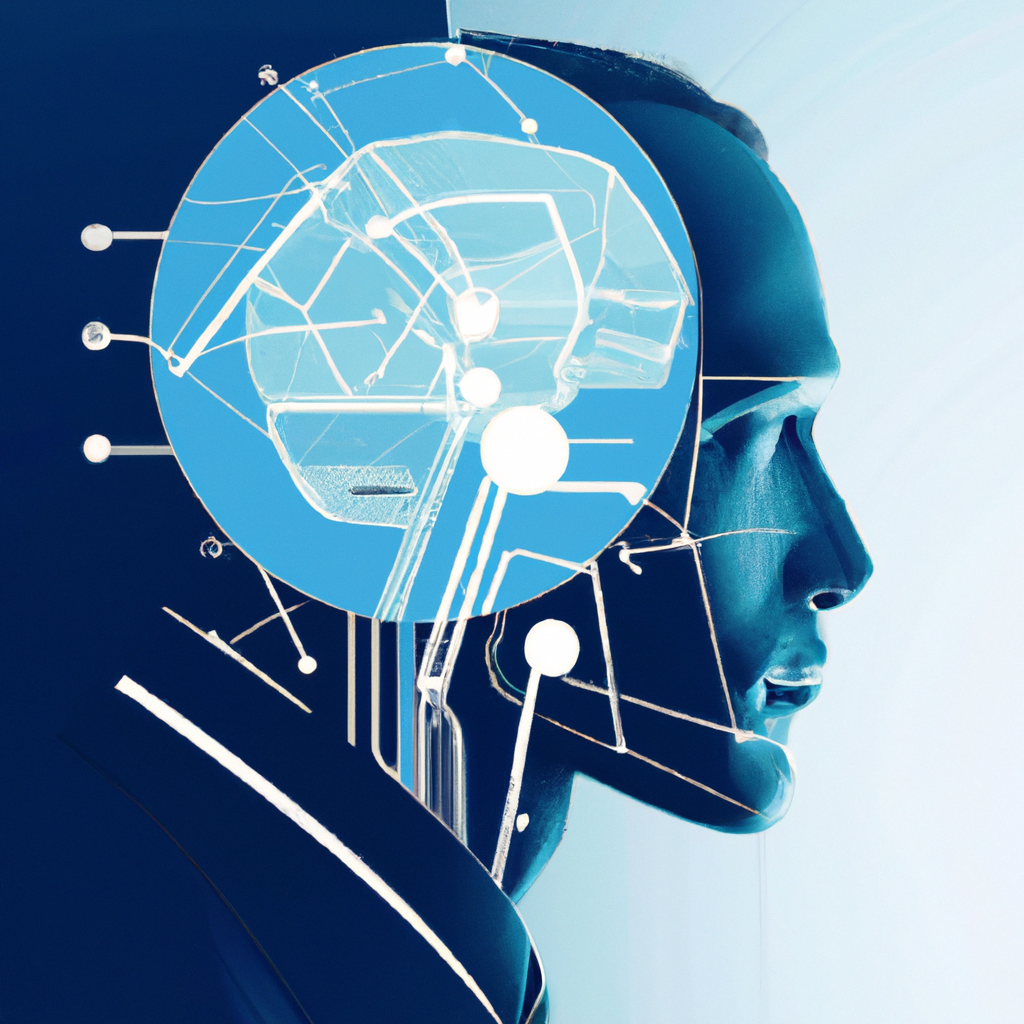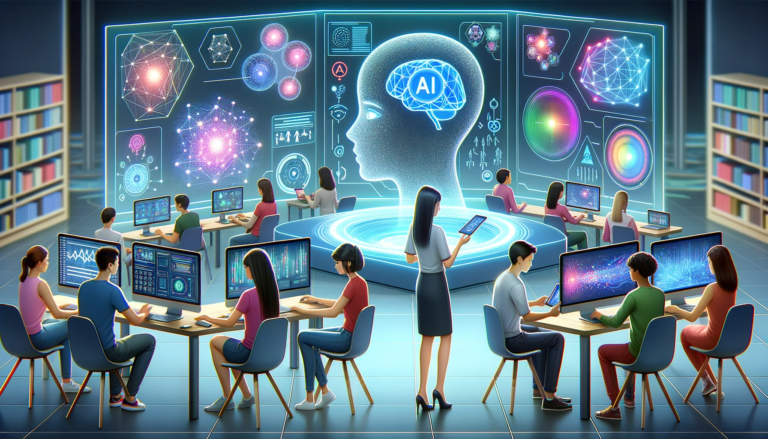
In today’s fast-paced world, providing exceptional customer service is more important than ever. But with the increasing expectations and demands of customers, it can be challenging for businesses to keep up. That’s where artificial intelligence (AI) steps in, revolutionizing the customer service industry. By harnessing the power of AI, businesses can streamline their processes, enhance personalization, and ultimately improve the overall customer experience. In this article, we will explore how AI can be utilized to take your customer service to new heights, ensuring customer satisfaction and loyalty.

Understanding the Basics of AI
Definition of AI
Artificial Intelligence (AI) refers to the simulation of human intelligence in machines that are programmed to think, learn, and problem-solve like humans. AI systems are designed to analyze vast amounts of data, make decisions, and perform tasks with minimal human intervention.
Types of AI
There are two main types of AI: Narrow AI and General AI. Narrow AI is designed to handle specific tasks and is focused on one area of expertise, such as speech recognition or data analysis. General AI, on the other hand, possesses the ability to understand, learn, and apply knowledge across different domains, similar to human intelligence.
Importance of AI in Customer Service
AI has revolutionized the customer service industry by enabling businesses to provide personalized and efficient experiences to their customers. With AI-powered tools and technologies, companies can analyze customer data, automate repetitive tasks, and offer timely and relevant support. AI has become a crucial component in improving customer satisfaction and driving business growth.
Benefits of Using AI in Customer Service
Enhanced Efficiency and Productivity
AI automates manual and repetitive tasks, allowing customer service agents to focus on more complex and value-added activities. By streamlining processes and reducing human error, AI enhances productivity and efficiency in customer service operations. With AI handling routine inquiries and tasks, agents can deliver faster and more accurate responses to customers.
Improved Customer Satisfaction
AI enables businesses to offer personalized and proactive customer experiences. Through data analysis and predictive analytics, AI tools can anticipate customer needs, provide relevant recommendations, and deliver tailored solutions. This level of personalized service enhances customer satisfaction and loyalty, leading to higher customer retention rates and increased revenue.
Cost Savings
Implementing AI in customer service can result in significant cost savings for businesses. By automating tasks that would otherwise require human labor, AI reduces the need for a large customer service workforce. This leads to reduced staffing costs and increased operational efficiency. Additionally, AI-powered chatbots and virtual assistants can handle a large volume of customer inquiries simultaneously, further reducing costs associated with hiring and training additional staff.
Implementing AI in Customer Service
Identifying Areas for AI Implementation
To successfully implement AI in customer service, it is essential to identify the areas that can benefit the most from AI technology. Typically, these areas include handling customer inquiries, automating repetitive tasks, analyzing customer data, and providing personalized recommendations. By assessing the pain points in their customer service processes, businesses can determine where AI can bring the most value.
Choosing the Right AI Tools
There are numerous AI tools available in the market, each with its own set of features and capabilities. It is crucial to evaluate and select the appropriate AI tools that align with the specific needs and goals of the business. Factors to consider include the tool’s ability to integrate with existing systems, scalability, ease of use, and compatibility with customer service channels.
Data Collection and Analysis
AI relies on large amounts of data to learn and improve its performance. Businesses need to ensure they have a robust data collection and analysis infrastructure in place to maximize the benefits of AI in customer service. This includes collecting and organizing customer data, implementing data analytics tools, and leveraging AI algorithms to extract actionable insights.
Creating Personalized Customer Experiences with AI
Utilizing Natural Language Processing
Natural Language Processing (NLP) is a branch of AI that focuses on understanding and interpreting human language. By utilizing NLP technologies, businesses can develop AI-powered systems that can understand and respond to customer inquiries in a natural and conversational manner. This enhances the overall customer experience by providing prompt and accurate assistance.
Implementing Chatbots and Virtual Assistants
Chatbots and virtual assistants are AI-powered tools that enable businesses to provide immediate and consistent support to customers. These tools can handle a wide range of customer inquiries, from answering simple questions to providing complex technical support. By implementing chatbots and virtual assistants, companies can reduce response times, increase availability, and deliver a seamless customer service experience.
Recommendation Engines
AI-powered recommendation engines analyze customer data and behavior to offer personalized product or service recommendations. By understanding customer preferences and past interactions, recommendation engines can suggest relevant offerings, promotions, or discounts. This not only enhances the customer experience but also increases the likelihood of repeat purchases and higher customer satisfaction.

Streamlining Operations with AI
Automating Repetitive Tasks
AI can automate repetitive and time-consuming tasks, freeing up valuable time for customer service agents to focus on more complex and strategic activities. Tasks such as data entry, routing inquiries, and generating automated responses can all be efficiently handled by AI systems. This not only improves operational efficiency but also reduces human error and allows agents to deliver faster and more accurate responses to customer queries.
Optimizing Resource Allocation
AI can play a crucial role in optimizing resource allocation in customer service operations. By analyzing historical data and customer patterns, AI systems can predict demand and allocate resources accordingly. This includes scheduling customer service agents based on anticipated volume, optimizing staffing levels, and ensuring that the right resources are available to meet customer needs, leading to improved service levels and reduced costs.
Predictive Analytics
AI-powered predictive analytics enables businesses to anticipate and address customer needs before they arise. By analyzing customer data and behavior, businesses can identify patterns, preferences, or potential issues that customers may be facing. This allows companies to take proactive measures, such as offering personalized recommendations or resolving issues preemptively, resulting in increased customer satisfaction and loyalty.
Ensuring Privacy and Security in AI Customer Service
Adhering to Data Protection Regulations
When implementing AI in customer service, it is crucial to ensure compliance with data protection regulations and privacy laws. Businesses must handle customer data responsibly and transparently. This includes obtaining explicit consent from customers for data collection and processing, maintaining data confidentiality, and adhering to regulations such as GDPR or CCPA to protect customer privacy.
Implementing Robust Security Measures
Security is paramount when using AI in customer service. Businesses need to implement robust security measures to safeguard customer data and protect against cyber threats. This includes encryption of customer data, strict access controls, regular security audits, and training employees on best cybersecurity practices. By prioritizing security, companies can provide customers with peace of mind and maintain their trust in the AI-powered customer service processes.
Managing Customer Data Safely
As AI relies on customer data for analysis and decision-making, it is essential to manage and handle this data safely. Businesses should establish clear data handling procedures, including secure storage, backup, and deletion processes. It is crucial to ensure that customer data is kept confidential, used only for the intended purposes, and disposed of appropriately in accordance with data protection regulations.
Training and Support for AI Systems
Building an AI Team
To successfully implement and maintain AI systems in customer service, businesses need to build a dedicated team of AI experts. This team should consist of data scientists, AI engineers, and domain experts who can work together to develop and optimize AI algorithms, train and fine-tune the AI models, and continuously improve the performance of the AI-powered customer service systems.
Providing Continuous Training
AI systems require continuous training to refine their performance and adapt to changing customer needs. This involves using customer feedback and data analytics to identify areas for improvement, updating AI models, and retraining algorithms. By providing ongoing training and support, businesses can ensure that their AI systems deliver the best possible customer service experience.
Monitoring and Evaluating Performance
It is essential to monitor and evaluate the performance of AI systems in customer service regularly. This includes tracking key performance indicators (KPIs) such as response times, customer satisfaction levels, and the accuracy of AI-generated responses. By monitoring performance, businesses can identify any issues or gaps in the AI systems and make necessary adjustments to improve overall performance and customer satisfaction.
Overcoming Challenges in AI Customer Service
Handling Complex Customer Queries
While AI excels at handling routine inquiries, it may struggle with more complex or nuanced customer queries. Businesses need to ensure that there is a seamless transition from AI to human agents when necessary, so that customers can receive personalized and expert assistance when needed. This requires well-defined escalation procedures and effective collaboration between AI systems and human agents.
Avoiding Overreliance on AI
While AI can greatly enhance customer service, it is important to strike the right balance between AI and human involvement. Overreliance on AI can lead to a lack of personalization and human touch in customer interactions. It is crucial to use AI as a tool to augment human capabilities rather than replace them, ensuring that customers receive a personalized experience that combines the efficiency of AI with the emotional intelligence of human agents.
Maintaining a Human Touch
Even with AI-powered systems in place, maintaining a human touch in customer service is essential. Businesses should encourage human agents to engage in empathetic conversations with customers, actively listen to their concerns, and provide genuine human interaction. AI systems can support human agents by providing them with relevant customer data and insights, enabling them to offer more personalized and effective support.
Maintaining Human-AI Collaboration
Combining Human Expertise with AI Capabilities
The most effective customer service strategies involve combining the expertise of human agents with the capabilities of AI systems. By leveraging the strengths of both, businesses can deliver exceptional customer experiences. Human agents can provide empathy, creativity, and complex problem-solving skills, while AI systems can offer efficiency, data analysis capabilities, and personalized recommendations.
Improving AI through Human Feedback
Human feedback is crucial for improving the performance and accuracy of AI systems. By gathering customer feedback and leveraging the expertise of customer service agents, businesses can identify areas where AI may fall short and make necessary improvements. Regular feedback loops ensure that AI systems continuously learn and improve, leading to enhanced customer service experiences over time.
Empowering Human Agents with AI Tools
AI tools can empower customer service agents by providing them with real-time customer insights and relevant information. By integrating AI-powered tools into agent workflows, businesses can assist agents in providing personalized, accurate, and efficient support. AI tools can automate data retrieval, suggest best practices, and offer contextual information, enabling agents to deliver exceptional customer experiences.
Embracing AI for Future Customer Service
Embracing Advanced AI Technologies
The future of customer service lies in embracing advanced AI technologies. These technologies include machine learning, deep learning, and neural networks, which have the potential to revolutionize how businesses interact with customers. Embracing these advanced AI technologies will allow companies to enhance personalization, automate complex tasks, and deliver seamless customer experiences across multiple channels.
Exploring AI-Powered Voice Assistants
AI-powered voice assistants, such as Amazon’s Alexa or Apple’s Siri, are becoming increasingly popular in customer service. These voice assistants leverage AI and natural language processing to provide customers with hands-free, voice-activated support. Exploring the integration of AI-powered voice assistants into customer service processes can offer convenience, accessibility, and a more natural and intuitive customer experience.
Leveraging AI for Predictive Customer Insights
AI has the potential to transform customer service from reactive to predictive. By leveraging AI algorithms and predictive analytics, businesses can anticipate customer needs and proactively address issues. AI can analyze customer behavior, patterns, and historical data to identify trends and predict future purchasing decisions or potential problems. This enables businesses to offer personalized recommendations, targeted marketing campaigns, and preemptive support, leading to increased customer satisfaction and loyalty.
In conclusion, AI has become a game-changer in the customer service industry, offering numerous benefits such as enhanced efficiency, improved customer satisfaction, and cost savings. By implementing AI in customer service operations, businesses can streamline operations, create personalized customer experiences, and ensure privacy and security. With the right training, support, and a focus on maintaining a human touch, AI can empower businesses to deliver exceptional customer service and embrace future advancements in AI technologies.






